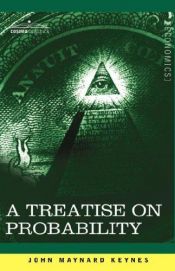A Treatise On Probability
Resumen
A Treatise on Probability was published by John Maynard Keynes while at Cambridge University in 1921. The Treatise attacked the classical theory of probability and proposed a "logical-relationist" theory instead. In a 1922 review, Bertrand Russell, the co-author of Principia Mathematica, called it "undoubtedly the most important work on probability that has appeared for a very long time," and a "book as a whole is one which it is impossible to praise too highly."The Treatise is fundamentally philosophical in nature despite extensive mathematical formulations. The Treatise presented an approach to probability that was more subject to variation with evidence than the highly quantified classical version. Keynes's conception of probability is that it is a strictly logical relation between evidence and hypothesis, a degree of partial implication. Keynes's Treatise is the classic account of the logical interpretation of probability, a view of probability that has been continued by such later works as Carnap's Logical Foundations of Probability and E.T. Jaynes Probability Theory: The Logic of Science.

 Español
Español English
English Deutsch
Deutsch










Reseñas de los usuarias/os Escribe tu propia reseña
Sé el/la primera/o en reseñar
Log inir al comentario